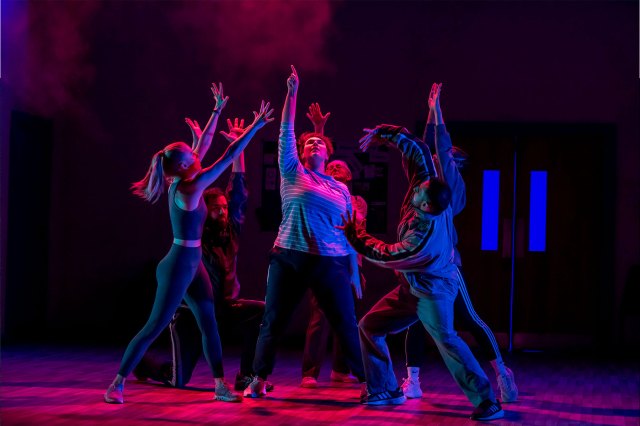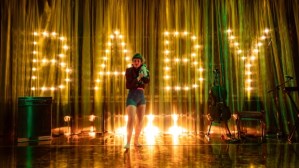
Eve Steele’s new play seems poised to be a workout for the emotions – both the audience’s and the characters’. It’s set at a dance fitness class that initially seems frivolous, before the disparate group reveal themselves as dependent on it to temper their stress and mental health challenges.
There’s a palpable awkwardness to the opening moments with the characters’ fidgety entrances – and bottled exits, for some – one by one. Even the flyers on the notice board are half-clinging to it as though they don’t want to be there either. The group scatters across the perimeter of the room. Sarah Frankcom’s direction gradually unifies them – almost without you realising – as they slowly gravitate towards the centre and fill an initially vast space with its lofty ceiling.
She also brings out all their distractions and deflections in Steele’s script. They fuss over furniture arrangements or tea preferences. Aaron McCusker’s Rab unloads bravado, with overfamiliar comments to the women. He’s brilliant at unmasking what sits beneath: an alcoholic whose own repulsed daughter asked him bitterly “Why don’t you just die?” The dark glaze he casts over his face and dispassionate delivery suggests, following that wound, that he did.
It’s leavened with absurd dance routines to incongruous pop songs. The weariness and grouchiness against the forced, often strained cheeriness of the class’s instructor, Alice (Elizabeth Twells), amusingly suggest she’s no more “normal” than them. However, she never quite feels integrated, always totally secondary to the troubled ensemble. Why she’s so invested in delivering this course to this group is never explored, nor is the motivation of an older lady, Marie (Eithne Browne).
The play builds dynamics between their interactions and contributions to the group numbers. But it also externalises too much with each character given a direct-address monologue where everything we might’ve inferred is declared in a single hit. This repeated structure also makes it feel like the circuit exercise, moving from one character or station to the next. There’s a jerky rhythm throughout that continuously builds to climaxes in the second half, making it feel long and slow.
The sense of truthfulness is slightly undercut by some cliches. The journey of single, ex-addict mother, Siobhan (portrayed by Steele herself), feels particularly dramatically manipulative and less original, relapsing right before she earns a crucial, hard-won meeting with her daughter, as well as her final fate. Her connection with Rab is thinly sketched, even if it shows how two equally lost people will hurl themselves at each other out of sheer desperation. But Steele captures the restlessness of the survivor, with quick, skittering marches through the room, and every line she speaks rises like a plea.
Steele heightens the crisis and lends a sharper political context when the characters have to apply for funding to sustain the class – not only fighting to keep this community lifeline, but cruelly forced to compete against numerous other worthy causes. Shaq’s (Dominic Coffey) progress to confidence is also interrupted by his struggle to secure council housing. It doesn’t need, therefore, to make blunt and glancing shots at other sociopolitical issues – capitalism destroying the planet; working people resorting to food banks; the “blatant genocide” of British politicians – along with an equally undeveloped reference to Covid.
Dance serves as a shared language where these characters suddenly become articulate and in control. Shaq – previously tight and anxious about his Tourette’s – surges across the stage, rippling through the air, his body suddenly as mobile as a ribbon, open and animated. There’s a rage, too, lowering his head like a charging bull. It’s in these sequences when the production really works it out.
















